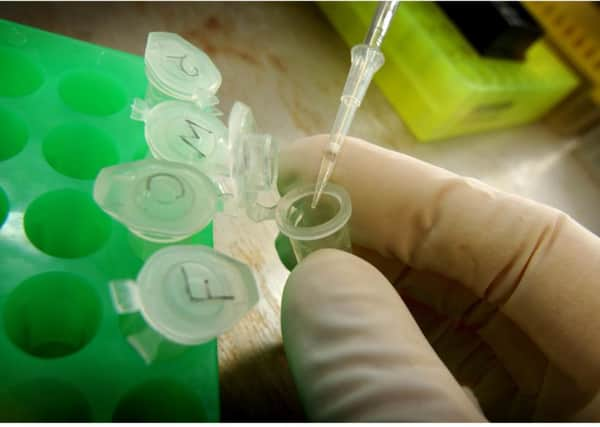Scientists awarded £600k to fight cancer


The team, led by Dr Jon Shephard of Heriot Watt University in Edinburgh, have been given the grant to develop a working prototype of the tool, which combines optical fibres that are about the width of a human hair with laser technology.
In addition, a new optical imaging agent is being used to help detect cancerous cells more easily.
Advertisement
Hide AdAdvertisement
Hide AdBowel cancer is the fourth most common form of the disease, after breast, prostate and lung cancers, with more than 41,000 people diagnosed across the UK each year.
About one in 14 men and one in 19 women will be diagnosed with the disease during their life, according to the charity Bowel Cancer UK.
At the moment, the tools surgeons use in bowel procedures can “make it hard for physicians to navigate around the organ and identify tumours”, Dr Shephard said.
But by using flexible fibres, medics will be able to steer the new device easier inside the body, allowing for greater precision when doctors are performing surgeries.
The three-year grant of £628,000 to develop a working prototype has been made by the Engineering and Physical Sciences Research Council (EPSRC) through the Healthcare Impact Partnership scheme.
While Dr Shephard specialises in the use of lasers in medicine, the team includes experts from Edinburgh Molecular Imaging Ltd, with Professor David Jayne from the NIHR Healthcare Technologies Co-operative at Leeds University providing clinical expertise.
Dr Shephard said: “This EPSRC funding will allow us to create a steerable surgical tool guided by fluorescent molecular probes, improving the likelihood patients will be treated successfully and minimising the risks of the operation.
“We have formed an excellent partnership working across the project, including experts in high-power laser applications, surgical technologies and molecular imaging.
Advertisement
Hide AdAdvertisement
Hide Ad“I am confident that we will be able to further develop the technology and improve the life-saving colorectal surgical procedure, which in turn will become transferable to other life-threatening conditions.”
Bowel cancer is a general term for cancer that begins in the large bowel. Depending on where the cancer starts, bowel cancer is sometimes called colon or rectal cancer.
Cancer can sometimes start in the small bowel (small intestine), but small bowel cancer is much rarer than large bowel cancer.
The three main symptoms of bowel cancer are blood in the stools (faeces), changes in bowel habit – such as more frequent, looser stools – and abdominal (tummy) pain.
As almost nine out of ten people with bowel cancer are over the age of 60,